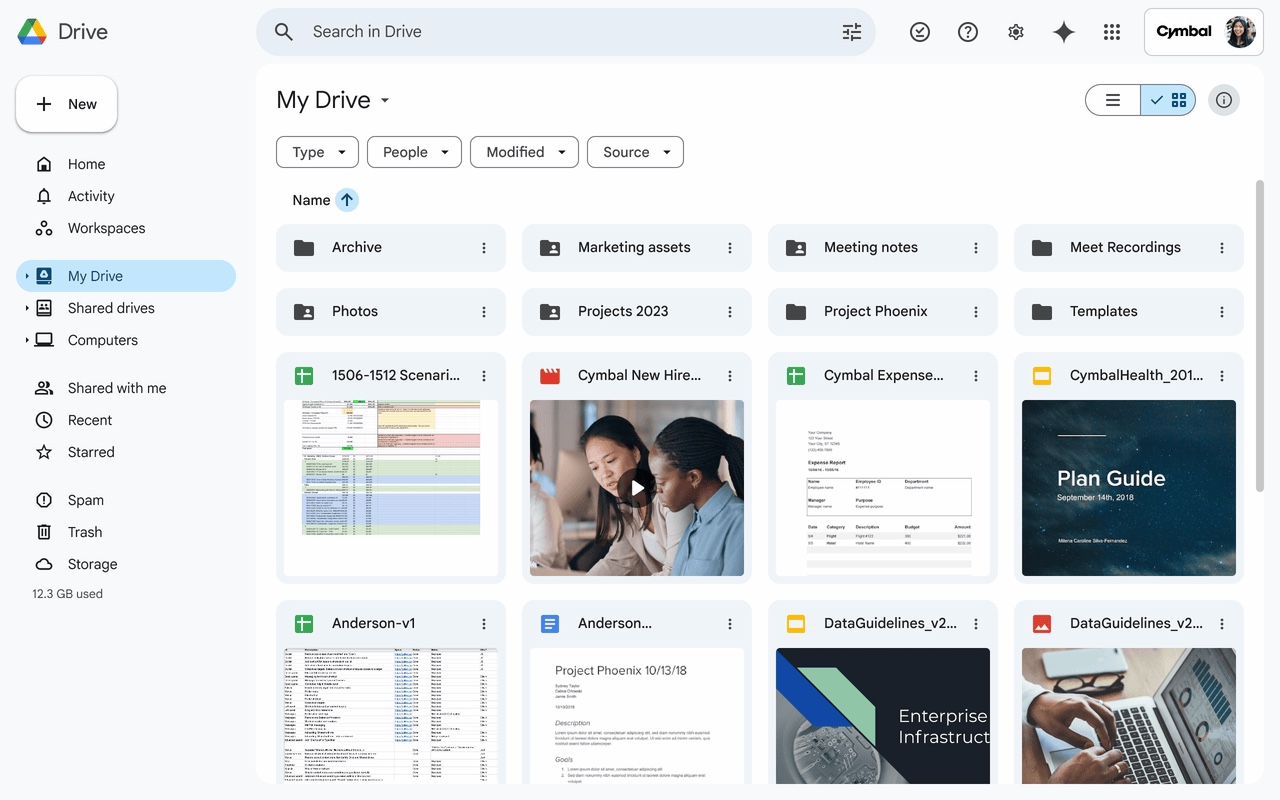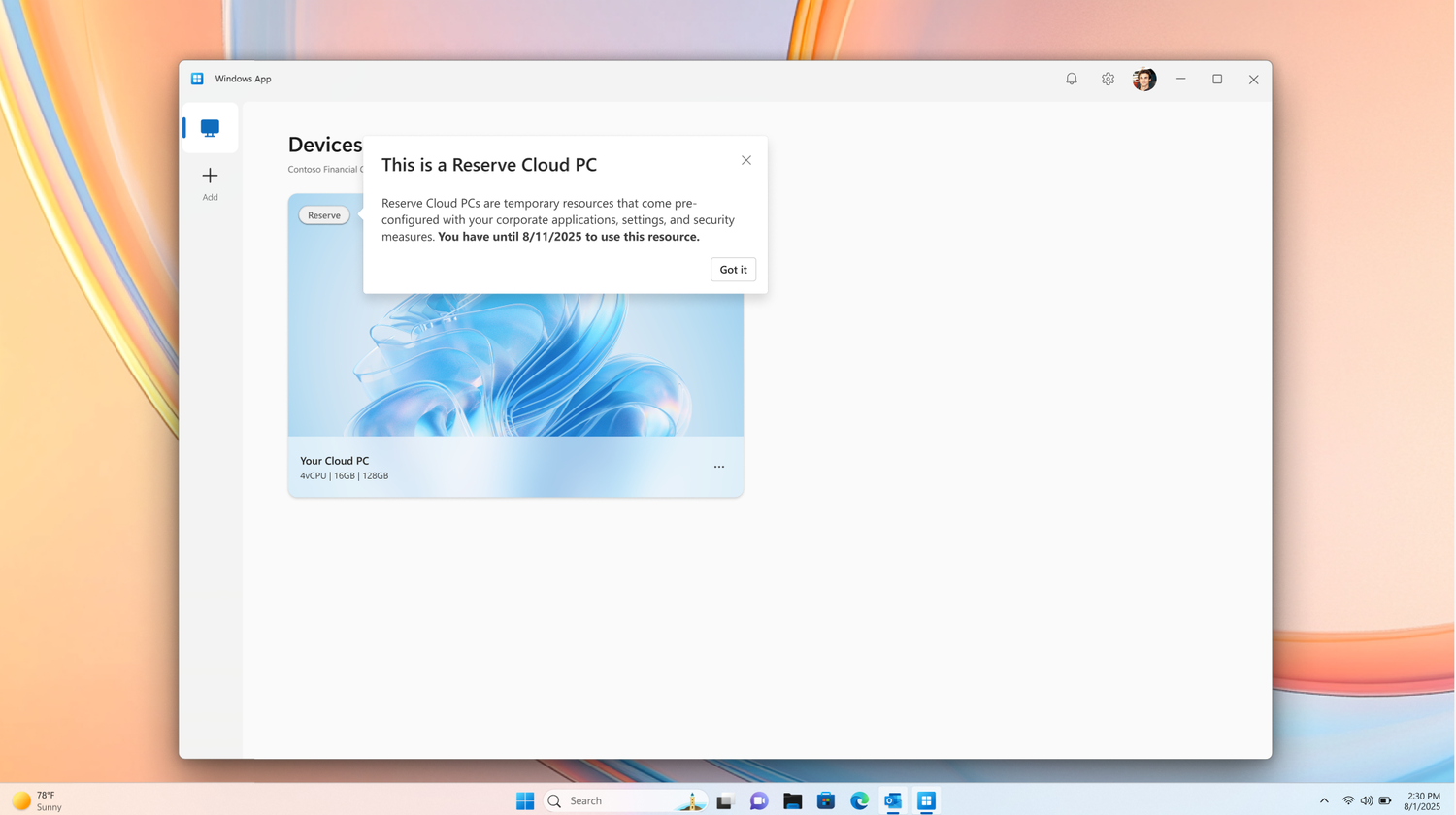
Google Drive simplifies video editing
Google Drive is home to every type of file imaginable, and a decent proportion of those files are videos. It is with this in mind that Google has decided to make it easier to edit videos which have been uploaded to its cloud storage service.
Rather than adding video editing tools directly into Google Drive, the company is instead making it easier to access the option to do so using Google Vids.

Microsoft launches Windows 365 Reserve preview to reduce downtime
Microsoft has launched a limited public preview of Windows 365 Reserve, a new cloud-based service to help reduce downtime and disruption for business when disaster strikes.
Whether there is a system failure, a cyberattack, or something else goes wrong, Windows 365 Reserve provides access to a Cloud PC to help reduce disruptions. Microsoft says that it offers businesses “secure and on-demand Cloud PC access from anywhere when you need it most”.

New agentic AI platform helps teams fix cloud security problems faster
Security teams are often hampered by having to identify and fix issues while weeding out false positives. This is an area where AI can help and Sysdig has launched a new agentic platform designed to analyze cloud environments end-to-end and uncover hidden business risk so organizations can remediate crucial threats fast and deliver measurable improvements in their security posture.
Sysdig Sage, the company’s AI cloud security analyst, ultimately understands context from the entire business and provides clear, contextual remediation recommendations, reducing an organization’s exposure time to critical vulnerabilities.

Cloud accounts come under attack as identity threats rise
The latest Threat Detection Report update from Red Canary shows a rise of almost 500 percent in detections associated with cloud accounts during the first half of 2025.
This significant rise stems primarily from Red Canary’s expanded identity detection coverage and the implementation of AI agents designed to identify unusual login patterns and suspicious user behaviors. This includes identifying logins from unusual devices, IP addresses, and virtual private networks (VPNs), which significantly increases the detection of risky behaviors.

Sudden Dropbox Passwords closure leaves users seeking alternatives
Dropbox has suddenly announced that it plans to discontinue its password manager, Dropbox Passwords. With the discontinuation coming at the end of October, users are left with very little time to find an alternative service.
The company is best known for its cloud storage service, and in announcing the impending shuttering of Dropbox Passwords it says that it wants “to focus on enhancing other features in our core product”. More than just closing down the password management side of things, Dropbox is also bringing dark web monitoring to an end.

Why real-time visibility is key to runtime security [Q&A]
Cloud threats are evolving faster than most security teams can respond, and traditional security tools are struggling to keep pace. According to IBM’s 2024 Cost of a Data Breach Report it now takes an average of 258 days to detect and contain a breach -- giving attackers more than enough time to access sensitive data and move laterally through cloud infrastructure undetected.
We spoke to CEO of Upwind, Amiram Schacha, to learn why organizations need real-time visibility and protection at the runtime layer -- where threats actually occur -- in order to close this growing security gap.

Internet-exposed assets reveal industry vulnerability profiles
New analysis from CyCognito of over two million internet-exposed assets, across on-prem, cloud, APIs, and web apps, identifies exploitable assets across several key industries, using techniques that simulate real-world attacker behavior.
Techniques used include black-box pentesting using 90,000+ exploit modules, credential stuffing simulations, data exposure detection, etc. The study also used Dynamic Application Security Testing (DAST) to identify runtime web application vulnerabilities, as well as active vulnerability scanning of internet-facing services to detect CVEs, misconfigurations, and exposed assets.

SMEs need to get a grip on their cloud costs
According to the Office for National Statistics, in late May 2025, 77 percent of UK businesses with 10 or more employees reported that their staffing costs, covering wages, bonuses, national insurance (NI) and pension contributions, had increased over the preceding three months; a rise of 41 percent since late February 2025, and a 17 percent rise from the year before.
In the light of this Brian Sibley, Virtual CTO at Espria, says clear and concise billing models for the cloud are needed for a wholly comprehensive understanding and urges businesses to urgently assess their MS Azure subscriptions to reduce costs and improve services.

UK tech leaders want the government to stop buying US cloud
New research reveals a surge in interest in data sovereignty among UK IT leaders since the implementation of the United States government's historic raft of tariffs in April.
The study from Civo, of over 1,000 UK-based IT leaders, shows more than 60 percent now feel that the UK government’s use of US cloud services exposes the country's digital economy to significant risks, damages its domestic industry, and threatens data security.

Why MSPs are the key to a better enterprise cloud experience [Q&A]
In recent years more and more organizations have been turning to the cloud for their IT requirements.
But with public, private and hybrid options to choose from the cloud landscape is complex. It's no surprise then that enterprises are increasingly leveraging MSPs to manage their public cloud deployments for them.

Critical vulnerabilities found across all cloud providers
A new report from CyCognito highlights critical security vulnerabilities across cloud-hosted material, revealing that one in three easily exploitable vulnerabilities or misconfigurations are found on cloud assets.
Though uncommon, critical vulnerabilities (CVSS 9.0 or higher) have been detected on assets hosted by all cloud providers, with assets hosted by Azure showing a slightly higher percentage (0.07 percent) compared to assets hosted by AWS and Google Cloud (0.04 percent).

AI adoption accelerates security risks in hybrid cloud
Hybrid cloud infrastructure is under mounting strain from the growing influence of artificial intelligence, according to a new report.
The study, from observability specialist Gigamon, of over 1,000 global security and IT leaders, shows breach rates have surged to 55 percent during the past year, representing a 17 percent year-on-year rise, with AI-generated attacks emerging as a key driver of this growth.

Stratoshark has been donated to the Wireshark Foundation to boost open source cloud security
Cloud security company Sysdig has announced the donation of Stratoshark, the company's open source cloud forensics tool, to the Wireshark Foundation.
This move is aimed at fostering innovation within the community, building in the open, and pushing security forward with advanced tools that better understand cloud-native environments.

From cloud rush to cloud strategy: The next wave of migrations
Over the past decade, enterprises have raced to adopt the cloud, often through "lift-and-shift" strategies built for speed rather than optimization. Cloud-first mandates swept across industries, especially in finance, retail, and healthcare, as organizations scrambled to modernize.
These early migrations often preserved legacy inefficiencies, resulting in bloated spend and limited performance gains.

Overcoming the cloud of uncertainty
The cloud industry has evolved significantly over the years, with VMware standing out as a key player in cloud computing, its reputation in the market helped it gain significant market share and facilitated a successful acquisition by tech giant Broadcom in November 2023. It has been over a year since this happened and, as with all acquisitions, it prompted companies to consider how it might impact their requirements.
Broadcom implemented several changes to VMware’s cloud offering, including sunsetting the option to buy perpetual VMware in 2024, terminating OEM agreements and ending support contacts. Most recently it announced its licence changes whereby it is raising the minimum core licensing requirements to 72 cores.
